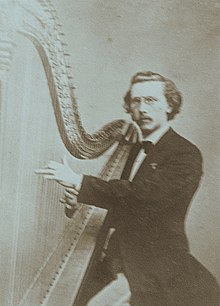Adolf Sjödén
Adolf Sjödén (born January 15, 1843 in Sollefteå , Sweden; † June 15, 1893 in Biel , Switzerland) was a Swedish harp virtuoso .
Life
The son of a Swedish Lensman attended high school in Härnösand , where he was taught by the music teacher Anders Sidner. The special focus of this training was on piano and violin playing. Despite his musical talent, Sjöden did not want to be trained as a professional musician at first, but began studying medicine in Uppsala, which he later broke off. After dropping out of his studies, Sjöden earned his living with musical performances at festivities and events until the concertmaster Eduard Pratte discovered him, who offered to teach him the art of harp playing. Sjödens decision to devote himself to this unusual instrument in the future was favored by the fact that he had already received harp lessons in Solleftea in his youth. In the following years he was able to expand his knowledge in this area significantly. In 1865, Sjöden traveled to Vienna on Pratte's advice to continue training with the composer Anton Zamara . The zeal with which he pursued his musical studies, however, weakened the artist's health, which is why he traveled to Italy because of the better climate. In 1867 he appeared for the first time in Tyrol, where he gave samples of his skills in Bozen, Meran, Hall and Innsbruck. A year later he went to Rome, where he became acquainted with Franz Liszt . He showed his appreciation for Sjöden by arranging several pieces of music for the harp for him.
In the following years Sjöden undertook extensive concert tours that took him through several European countries, including Russia. After stays in southern Germany and France, he lived for two years in England and Wales, where he learned the special technique that playing the Welsh triple harp requires of an artist. A highlight of his musical career was the performance of the Concerto in B flat major for harp and orchestra by Georg Friedrich Handel , who was also attended by the royal family. After this performance, the artist felt compelled to move to a warmer area because of his poor health. He traveled to Portugal, where he was able to fully develop his musical talent at the court of the art-loving King Ludwig .
After a stay in Madeira in the winter of 1872, Sjöden returned to Sweden, where he gave a big concert after years of absence. Now he was able to succeed in the Scandinavian countries, which had previously only found the desired recognition abroad. From 1877 he again filled the concert halls in Denmark, France and England, but the artist preferred to stay in southwest Germany and Switzerland. With a new instrument, which he had acquired at the Paris World Exhibition for the fabulous price of 10,000 francs, the artist appeared in the winter of 1879 to the surprise of the Innsbruck public in the Tyrolean capital, where the modest and very sociable harpist was still remembered, but because of his long absence and his permanent bad health he had already been considered dead.
Little is known about the artist's last years. Shortly before his death, he is said to have toyed with the idea of going on a concert tour to America.
Sjöden was the holder of several awards, including the Bene Merenti Order of the Governing House of Hohenzollern, the Great Baden Order of the Zähringer Lion and the Order of the Portuguese Knights of Christ .
He died on June 15, 1893 on the occasion of a stay in Switzerland at the age of 51.
Varia
After the death of his teacher Pratte, Sjöden acquired a pedal harp from his estate , which the master had received from Tsar Nicholas I as a present on the occasion of a stay in Russia. After Sjöden's death, the valuable instrument came to his nephew, who in 1906 donated it to the Museum of Music History in Stockholm.
In 2017, a previously unknown transcription for the harp of Liszt's piano piece Ave Maria by Arcadelt was found in the Murberget Museum , which came from the estate of Sjödens. Up until now it had been assumed that all the transcriptions Liszt made for this instrument would be lost.
Weblinks (Swedish)
- [1] (Nekrolog, Swedish)
- [2] (attempt of a biography about the Swedish harpist, by Barbo Sjöden, Swedish)
- [3] (Franz Liszt and Adolf Sjöden)
Individual evidence
- ↑ Adolf Sjöden. In: Innsbrucker Nachrichten , December 24, 1879, p. 4 (online at ANNO ).
| personal data | |
|---|---|
| SURNAME | Sjödén, Adolf |
| BRIEF DESCRIPTION | Swedish harp virtuoso |
| DATE OF BIRTH | January 15, 1843 |
| PLACE OF BIRTH | Solleftea , Sweden |
| DATE OF DEATH | June 15, 1893 |
| Place of death | Biel , Switzerland |
